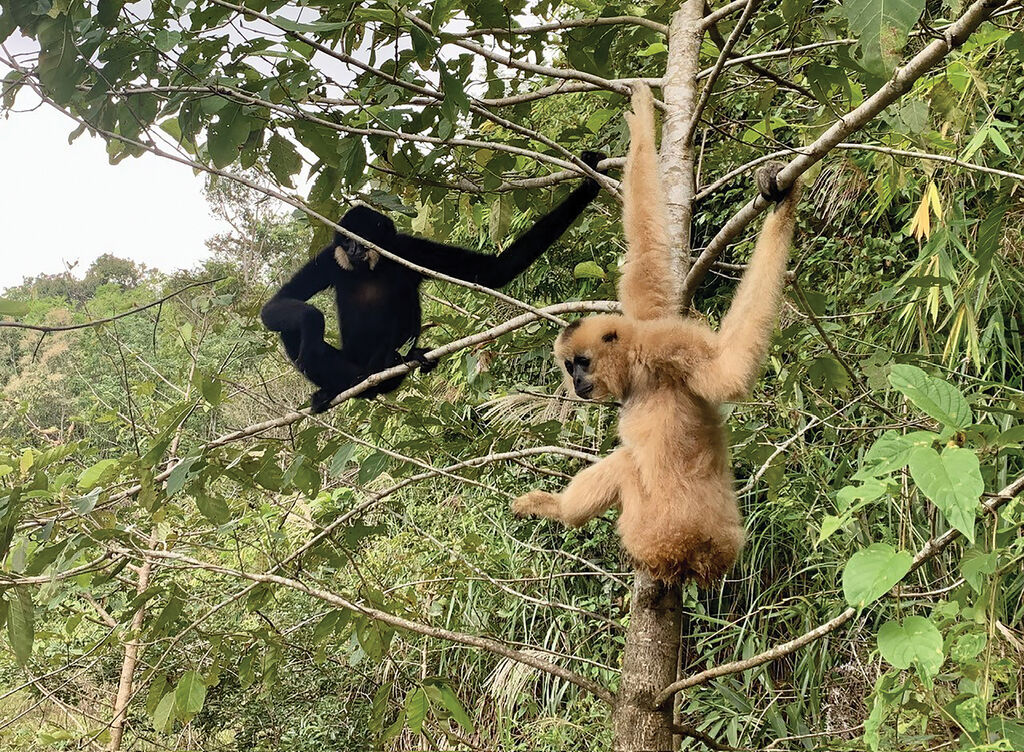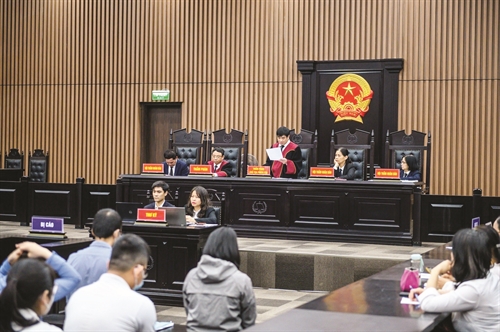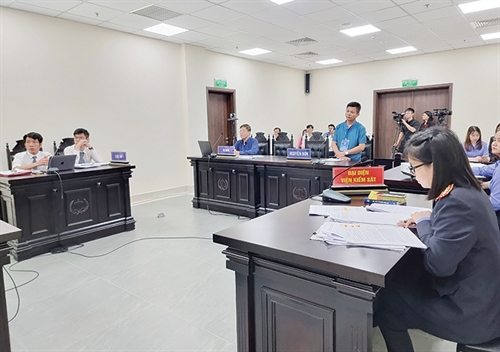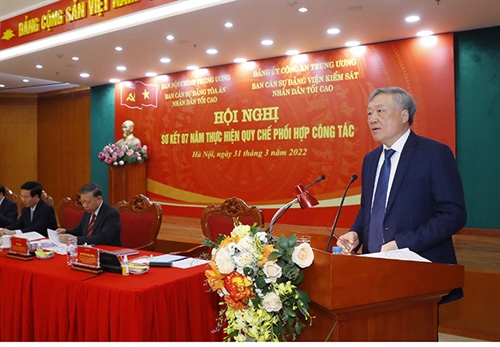Nguyen Thi Tam
Deputy Head of Department 14
Supreme People’s Procuracy
 |
| Northern buffed-cheeked gibbons (Nomascus annamensis) are released to the wild at Ta Dung national park, Dak Nong provine__Photo: VNA |
The 2015 Penal Code (revised in 2017) (the Penal Code) contains two articles: Article 234 on violating regulations on management and protection of wildlife and Article 244 on violating regulations on protection of endangered, precious and rare animals. In this article, the term “wild animals” refers to “wild animals” specified in Article 234 and “endangered, precious and rare animals” specified in Article 244.
The criminal procedure provisions on settlement of wildlife cases constitute a branch of the legal framework on wildlife conservation to handle violations of regulations on wildlife protection and include a system of regulations on order and procedures for settlement of wildlife-related cases. At present, criminal procedure provisions on settlement of wildlife-related cases can be found in numerous legal documents, including first of all the following:
· The 2015 Criminal Procedure Code (revised in 2021) (the Criminal Procedure Code) and its guiding texts;
· The 2012 Law on Judicial Expertise (revised in 2020);
· The Supreme People’s Court’s Judicial Council’s Resolution 05/2018/NQ-HDTP guiding the application of the Penal Code’s Article 234 on violating regulations on management and protection of wildlife and Article 244 on violating regulations on protection of endangered, precious and rare animals (Resolution 05/2018/NQ-HDTP);
· Government Decree 30/2018/ND-CP dated March 7, 2018, on the establishment and operation of the asset valuation council, and order and procedures for asset valuation in criminal procedure;
· Government Decree 06/2019/ND-CP dated March 10, 2019, promulgating the List of endangered, precious and rare wild fauna and flora; management and protection, and order and procedures for exploitation of endangered, precious and rare wild fauna and flora; keeping of common forest animals; and implementation of the CITES in Vietnam;
· Government Decree 97/2019/ND-CP dated December 23, 2019, amending and supplementing a number of articles of Government Decree No. 30/2018/ND-CP on the establishment and operation of the asset valuation council, and order and procedures for asset valuation in criminal procedure;
· Government Decree 84/2021/ND-CP dated September 22, 2021, amending and supplementing a number of articles of Government Decree 06/2019/ND-CP promulgating the List of endangered, precious and rare wild fauna and flora; management and protection, and order and procedures for exploitation of endangered, precious and rare wild fauna and flora; keeping of common forest animals; and implementation of the CITES in Vietnam;
· Ministry of Agriculture and Rural Development’s Circular 29/2019/TT-BNNPTNT dated December 31, 2019, guiding regulations on disposal of forest animals being exhibits or material evidences; and forest animals voluntarily submitted by organizations and individuals to the State;
· Ministry of Finance’s Circular 30/2020/TT-BTC, dated April 17, 2020, guiding a number of articles of Government Decree No. 30/2018/ND-CP on the establishment and operation of the asset valuation council, and order and procedures for property valuation in criminal procedure, and Decree 97/2019/ND-CP, amending and supplementing a number of articles of Decree 30/2018 /ND-CP.
Below are analyzed criminal procedure provisions concerning the settlement of wildlife-related cases, including points to prove; authority for and duration of investigation of wildlife-related cases; expert examination, valuation and disposal of material evidences.
The points to prove
Determining the points to prove in wildlife-related criminal cases should be based on Articles 234 and 244 of the Penal Code and Article 85 of the Criminal Procedure Code, including:
Firstly, whether or not any offense against regulations on management and protection of wildlife and protection of endangered, precious and rare animals has been committed? And what are time, location and other details of the offense?
It is especially important to identify species of affected wild animals, individuals or vital body parts or products of wildlife under Clauses 1, 2, 4, 5 and 6, Article 2 of Resolution No. 05/2018. Specifically, to identify affected species: (i) regarding Article 234 of the Penal Code, affected species must be on the list of Group-IIB endangered, precious and rare forest animals specified in Decree 84/2021, or endangered wildlife species listed in Appendix II to the CITES or other wildlife species guided in Article 2.2 of Resolution No. 05/2018, including species listed in Appendix III to the CITES and common forest animals specified in Article 3.8 of Decree No. 06/2019 (including live or dead animals, vital body parts or products of animals); (ii) regarding Article 244 of the Penal Code, affected wild animals must be on the list of endangered, precious and rare species prioritized for protection, or endangered, precious and rare forest animal species of Group IB specified in Decree 84/2021, or endangered, precious and rare animals listed in Appendix I to the CITES.
Secondly, who has committed the illegal act? Whether his act has been committed intentionally or unintentionally? Does he has the criminal liability capacity? What are the motivation and purpose of the offense? And is there any accomplice?
Thirdly, it is necessary to prove and clarify penal liability-aggravating and -extenuating circumstances specified in Articles 29, 51, 52 and 59 of the Penal Code, and clarify personal identity characteristics of the offender as well as causes of, and conditions for, the crime commission.
Fourthly, it is necessary to determine the nature and extent of damage caused by the offense.
Wildlife-related criminal case investigation competence and duration
Investigation competence
In pursuance to Articles 34.1 and Article 36.1 of the Law on Organization of Criminal Investigation Bodies (the Law) and Article 163 of the Criminal Procedure Code, the forest ranger and fisheries surveillance forces and specialized investigation bodies are competent to initiate and investigate cases of violation of regulations on protection of endangered, previous and rare animals. For the offense of violating regulations on management and protection of wildlife, the Law does not specify agencies assigned to carry out a number of investigating activities that may initiate or investigate wildlife-related criminal cases. In other words, the competence to investigate cases involving the offense prescribed in Article 234 of the Penal Code rests only with specialized investigation bodies.
Investigation duration
As specified in Article 172 of the Criminal Procedure Code, with reference to Articles 9, 234 and 244 of the Penal Code, the duration of investigation of the offenses of violating regulations on management and protection of wildlife and violating regulations on protection of endangered, precious and rare animals is determined as follows:
For the offense of violating regulations on management and protection of wildlife:
| Article 234 of the Penal Code | Investigation duration |
|---|---|
| Clause 1 and Clause 5.a | Up to two months. This investigation duration may be extended once for up to two months |
| Clause 2 and Clause 5.b | Up to three months. This investigation duration may be extended twice with the first extension not exceeding three months and the second extension not exceeding two months |
| Clause 3 and Clause 5.c | Up to four months. This investigation duration may be extended twice for up to four months each time |
For the offense of violating regulations on protection of endangered, precious and rare animals:
| Article 244 of the Penal Code | Investigation duration |
|---|---|
| Clause 1 and Clause 5.a | Up to three months. This investigation duration may be extended twice, with the first extension not exceeding three months and the second extension not exceeding two months. |
| Clause 2 and Clause 5.b | Up to four months. This investigation duration may be extended twice for up to 4 months each time |
| Clause 3 and Clause 5.c |
Asset appraisal and valuation
Asset appraisal and valuation play an important role in the investigation and settlement of wildlife-related criminal cases. Asset appraisal and valuation conclusions serve as a basis for settling such cases. Specifically, these conclusions may be used to prove illegal acts as well as their nature and severity and serve as a basis for penal liability aggravation.
Asset appraisal
When deeming it necessary, criminal procedure-conducting bodies may issue decisions to solicit expertise examination to identify species of affected animals. Such a decision to solicit expertise examination must have all the contents specified in Article 205.2 of the Criminal Procedure Code. It should be noted that the agency responsible for appraising endangered wildlife specimens specified in the CITES Appendices is the CITES Scientific Authority of Vietnam as specified in Article 31.4 and Article 34.2.d of Government Decree 06/2019 (as revised under Decree 84/2021. The Minister of Agriculture and Rural Development appoints the scientific agencies with appropriate expertise and capacity to act as the CITES Scientific Authorities of Vietnam. Under the Ministry of Agriculture and Rural Development’s Decisions 2249/QD-BNN-TCLN dated June 17, 2020 and 4519/QD-BNN-TCLN dated November 22, 2022, there are now 10 CITES Scientific Authorities of Vietnam that may carry out the appraisal of animals, aquatic life and plants.
Besides, as per Article 20 of the 2012 Law on Judicial Expertise (as revised in 2020), ministries, ministerial-level agencies and provincial-level People’s Committees have the power to decide on recognition of case-by-case judicial experts and judicial expertise institutions in fields and sectors under their management.
Under Article 10 of the Ministry of Agriculture and Rural Development’s Circular 49/2014/TT-BNNPTNT dated December 23, 2014, providing judicial expertise in the field of agriculture and rural development, specialized agencies may draw up and submit lists of judicial experts and judicial expertise institutions to the Minister of Agriculture and Rural Development and provincial-level People’s Committee chairpersons for decision on a case-by-case basis to meet requirements of criminal proceedings performed at their ministries, sectors and localities.
Duration of wildlife appraisal
Under Article 26a of the Law on Judicial Expertise, the maximum duration of wildlife appraisal is three months. In case of a complicated wildlife appraisal case or an appraisal case involving a large workload, such duration is four months. Ministries and ministerial-level agencies in charge of judicial expertise are required to base themselves on the maximum duration of wildlife appraisal and specific nature of fields subject to the appraisal to set the judicial appraisal duration each specific wildlife-related case. Such duration may be extended by half under decisions of the appraisal-soliciting agencies.
Asset valuation
Under Article 215 of the Criminal Procedure Code, when deeming it necessary to valuate assets involved in a wildlife-related criminal case for the purpose of settlement of such case, a competent proceeding-conducting body may make a written request for asset valuation which must have all law-specified contents, including the description of information and characteristics of the wildlife specimen that needs to be valuated.
As specified in Article 6 of the 2020 Investment Law, wild animals specified in Appendix III to the Investment Law are listed as goods banned from business investment. The valuation for such goods must comply with Article 15.2 of Government Decree 30/2018/ND-CP dated March 7, 2018, providing in detail the establishment and operation of asset valuation councils, and order and procedures for asset valuation in criminal proceedings, and Ministry of Finance Circular 43/2018/TT-BTC dated May 7, 2018, guiding a number of articles of Decree 30/2018/ND-CP.
Accordingly, the valuation of an asset being a banned goods must be based on at least one of the prices below (in the following order of priority): (i) Purchase/sale price collected on the unofficial market at the time and place when/where the banned goods is required to be valuated or in other localities; (ii) Price stated on the purchase and sale contract or invoice or the banned goods import declaration form (if any); (iii) Price provided by the price appraisal enterprise; (iv) Regional or world market price as announced or provided by a competent agency or organization; (v) Listed price or price recorded on the purchase and sale contract or invoice or the import declaration form for a similar asset that is allowed to be traded, circulated and used in Vietnam; (vi) Regional or world market price of a similar asset that is allowed to be traded, circulated and used in these markets; (vii) Other bases for determine the value of the asset subject to valuation provided by the competent criminal proceeding-conducting body.
Disposal of material evidences
In criminal cases, material evidences constitute one of important proofs to criminally charge people who are or are not involved in, and help further clarify circumstances of, such cases. Therefore, special importance should be attached to the disposal of material evidences in the entire process of investigation, prosecution and trial.
Particularly for wildlife-related criminal cases, affected wild animals or endangered, precious and rare animals[1] are the most important material evidences and the disposal thereof has special characteristics that require proceeding-conducting bodies with the disposing competence to adequately and firmly grasp relevant regulations to ensure proper disposal and biosecurity, thereby contributing to the effective and comprehensive conservation of wildlife and endangered, precious and rare animals. Article 106.1 of the Criminal Procedure Code stipulates: “The disposal of material evidences shall be decided by investigation bodies or bodies assigned to carry out a number of investigation activities if criminal cases are terminated at the stage of investigation; by procuracies if criminal cases are terminated at the stage of prosecution; by chief justices of courts if criminal cases are terminated at the stage of trial preparation; or by trial panels if criminal cases are brought for trial. The execution of decisions on disposal of material evidences shall be recorded in writing.”
It can be seen through the above provision that material evidences must be disposed of on the principle that at whatever stage the case is terminated, the body with the proceeding-conducting competence is competent to dispose of such material evidences Meanwhile, as per Article 106.3.d of the Criminal Procedure Code, material evidences that are wild animals and exotic plants shall be handed over to competent specialized management bodies for disposal in accordance with law immediately after expertise conclusions are made.”
As specified at Articles 7.1.a and 7.1.b of Resolution 05/2018/NQ-HDTP; Articles 10 and 32 of Government Decree 06/2019/ND-CP (as revised under Government Decree 84/2021/ND-CP); and Article 6.1 of the Ministry of Agriculture and Rural Development’s Circular 29/2019/TT-BNNPTNT), the aforesaid specialized management agencies may include the following agencies: (i) local forest protection offices; (ii) rescue centers, nature reserves and national parks; (iii) scientific research, training and environmental education institutions, and specialized museums; (iv) the CITES Management Authority of Vietnam; (v) provincial-level fisheries management agencies; (vi) facilities capable of rescuing live specimens or the nearest animal and plant quarantine agency; (vii) forest animal rescue facilities, zoological gardens, and special-use forest management boards with animal rescue facilities; and (viii) other agencies and institutions as specified by law.
Agencies that have conditions for wildlife nurturing and preservation may include: (i) local forest protection offices that receive endangered, precious and rare forest animals transferred under approved plans on disposal of assets under the all-people ownership and confiscation decisions of district- and commune-level competent agencies or persons; (ii) provincial-level forest protection agencies that receive forest animals of endangered, precious and rare species transferred under approved plans on disposal of assets under the all-people ownership and confiscation decisions of provincial-level or central competent agencies or persons; and (iii) forest animal rescue facilities, zoological gardens, scientific research and environmental education facilities, specialized museums, special-use forest management boards with animal rescue facilities.
In addition, in wildlife-related criminal cases, material evidences may also be assets, tools and vehicles used to commit crimes. Upon the disposal of these types of material evidences, competent proceeding-conducting bodies may consider confiscating and escheating them. As for other material evidences not related to such cases, these bodies may consider returning them to lawful owners or managers.
Disposal of wild animals or endangered, precious and rare animals being material evidences of temporarily suspended criminal cases
Under Article 13.1 of Joint Circular 01/2020/TTLT-VKSNDTC-TANDTC-BCA-BQP-BNNPTNT-BTC-BTP dated June 1, 2020, providing the coordination in the implementation of a number of articles of the Criminal Procedure Code on management and settlement of temporarily suspend cases and matters, the management and disposal of material evidences, documents, objects and temporarily seized assets in temporarily suspended cases and matters must comply with Article 90.1.d and Article 106.3 of the Criminal Procedure Code. In case of disposal of material evidences, documents, objects and temporarily seized assets of complicated nature, competent proceeding-conducting bodies are required to exchange opinions with one another and reach written agreement on disposal measures before issuing disposal decisions. Pending expertise conclusions, agencies that temporarily seize material evidences being wild animals or endangered, precious and rare animals are responsible for nurturing and preserving such animals or transferring them to facilities having conditions for nurturing and preserving them under Article 4 of Circular 29/2019/TT-BNNPTNT.-
This article is written within the framework of cooperation with the Wildlife Conservation Society Vietnam.
[1] These animals are supposed to live and grow in nature by natural laws and of special economic, medical, scientific and environment value.









